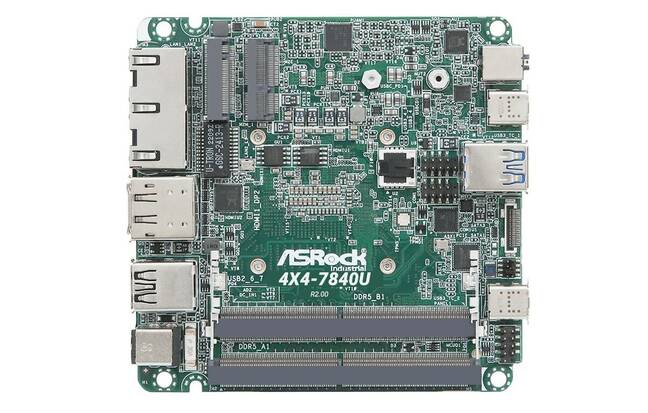Intel NUCs Find Fresh Life In Asus, But Rights Are 'non-exclusive'

Those mourning the discontinuation of Intel's quirky little Next Unit of Compute (NUC) mini-PCs can rest easy – Asus has officially taken over development of the product line. It's not exclusive, though, and already there's competition.
"Starting September 1st, NUC becomes a proud member of the Asus product lineup, setting off on an exhilarating journey ahead," the Taiwanese electronics vendor wrote in a tweet – or is it xeet?
The announcement comes after Intel announced it was phasing out the systems as part of sweeping cost-cutting measures across the x86-giant's portfolio. At the time, Chipzilla said it was handing the reins of NUC development over to its ecosystem partners.
Not long after, Asus emerged as the likely new shepherd of the NUC flock. In July, Intel revealed it was entertaining a "term sheet" with Asus for an agreement to manufacture, sell, and support 10th- through 13th-gen NUC hardware and develop future NUC system designs.
- Tinker Tailor Soldier Pi? Asus's 'NUC-sized' SBC aims to out-Pi the Raspberry
- Get 'em while you can: Intel begins purging NUCs from inventory
- Opportunity NUCs for Asus to continue Intel's mini PC line
- Intel pulls plug on mini-PC NUCs
Intel's NUC portfolio got its start in 2013 with a compact 4-inch by 4-inch system sporting laptop chips and a couple of unpopulated SODIMMs. In the decade since, the line frequently took on odd form factors and feature sets that catered to everything from pushing PDFs to gaming, edge, and IoT applications.
And from the looks of it, they're all still there – just sold and supported by Asus. The PC-maker's NUC product page displays a spread of familiar designs, which makes sense given the agreement disclosed in July stipulated supporting older NUC hardware.
Welcome to the free market
However, Asus doesn't have a monopoly on mini-PCs and certainly not over the NUC brand. The "proposed agreement" from July is non-exclusive, and the footnotes on Asus's NUC product page indicate this is still the case. According to Intel, the chipmaker "retains ownership of the technology and may license to others."
Asrock Industrial, for instance, offers NUC-branded PCs. And, as you might expect, none of these systems are sporting AMD or Arm processors.
Asrock also supplies non-Intel, not-NUCs, which it calls "4x4 BOX". However, Intel told The Reg the NUC brand isn't trademarked – so anyone is free to use it. Most likely Asrock's choices are down to customers identifying the NUC brand with Intel.
For those more interested in the form factor than what it's called, Asrock this week demoed a tiny mini-PC powered by AMD's 7040-series mobile processors.

The 4"x4" square motherboard houses an AMD Ryzen 7040U-series mobile processor with up to 8 cores and 16 threads – Click to enlarge
The ever-so-creatively named 4x4 BOX 7040U can be specced with either a 6-core/12-thread Ryzen 5 7640U or an 8-core/16 thread Ryzen 7 7840U. The APUs – what AMD likes to call its CPUs with onboard GPUs – come equipped with Radeon 760M or 780M graphics, respectively. Meanwhile, both configurations can be kitted out with up to 64GB of DDR5 5600MT/sec SODIMM memory, and feature AMD's Ryzen AI accelerator.
The latter delivers 10 TOPS of inferencing performance to speed up things like web-cam framing, background effects, or to make it look like you're actually looking at the camera when you're really doom scrolling social media during a Zoom call.
While the system can be had in a familiar NUC-inspired chassis, those looking to deploy the system in an industrial or embedded environment can opt for a bare bones motherboard. Unfortunately, prices for either of the two configs weren't listed at the time of publication, but from what we've seen in other industrial boards and PCs, they probably won't come cheap. ®
From Chip War To Cloud War: The Next Frontier In Global Tech Competition
The global chip war, characterized by intense competition among nations and corporations for supremacy in semiconductor ... Read more
The High Stakes Of Tech Regulation: Security Risks And Market Dynamics
The influence of tech giants in the global economy continues to grow, raising crucial questions about how to balance sec... Read more
The Tyranny Of Instagram Interiors: Why It's Time To Break Free From Algorithm-Driven Aesthetics
Instagram has become a dominant force in shaping interior design trends, offering a seemingly endless stream of inspirat... Read more
The Data Crunch In AI: Strategies For Sustainability
Exploring solutions to the imminent exhaustion of internet data for AI training.As the artificial intelligence (AI) indu... Read more
Google Abandons Four-Year Effort To Remove Cookies From Chrome Browser
After four years of dedicated effort, Google has decided to abandon its plan to remove third-party cookies from its Chro... Read more
LinkedIn Embraces AI And Gamification To Drive User Engagement And Revenue
In an effort to tackle slowing revenue growth and enhance user engagement, LinkedIn is turning to artificial intelligenc... Read more

